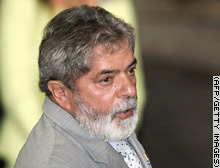 |
 |
 |
 News from Around the Americas | May 2007 News from Around the Americas | May 2007  
Brazil Bypasses Patent on AIDS Drug
 Associated Press Associated Press


| | Brazilian President Luiz Inacio Lula da Silva issued a "compulsory license" to bypass the patent of U.S. AIDS drug efavirenz. |
Brasilia, Brazil - President Luiz Inacio Lula da Silva took steps Friday to let Brazil buy or produce an inexpensive generic version of an AIDS drug made by Merck & Co. despite the U.S. drug company's patent.

Lula da Silva issued a "compulsory license" that would bypass Merck's patent on the AIDS drug efavirenz, a day after the Brazilian government rejected Merck's offer to sell the drug at a 30 percent discount, or $1.10 per pill, down from $1.57.

The country was seeking to purchase the drug at 65 cents a pill, the same price Thailand pays.

It was the first time Brazil has bypassed a patent, but Lula da Silva said Brazil would consider doing so again on any drug sold at unfair prices. "Between our business and our health, we are going to take care of our health," he said after signing the decree.

"We're profoundly disappointed with Brazil's decision to expropriate our intellectual property. They are sending a chilling signal," said Jeffery Sturchio, Merck's vice president for corporate responsibility, in a telephone interview. "We are considering our course of action but that will take some time."

A compulsory license is a legal mechanism that allows a country to manufacture or buy generic versions of patented drugs while paying the patent holder only a small royalty.

Brazilian law and rules established under the World Trade Organization allow for compulsory licenses in a health emergency or if the pharmaceutical industry uses abusive pricing.

After Thailand moved to override patents on three anti-AIDS drugs, including those made by Abbott Laboratories and Merck, the United States placed Thailand on a list of copyright violators.

In Thailand's capital of Bangkok, AIDS activists rallied outside the U.S. Embassy on Thursday to protest the decision, calling the Thai government's move to slash the cost of pricey U.S.-made AIDS drugs a "lifesaver."

The president of the U.S.-based AIDS Healthcare Foundation, Michael Weinstein, called Brazil's action a "victory," saying in a statement, "We salute the courage of countries such as Brazil, Thailand and Mexico who are fighting to ensure drug access for AIDS patients the world over.

"Drug companies will go down in defeat every time they place themselves in the way of justice for AIDS patients," he said.

But the U.S.-Brazil Business Council said the decision was a "major step backward" in intellectual property law and warned it could harm development.

"Brazil is working to attract investment in innovative industries ... and this move will likely cause investments to go elsewhere," the council said in a statement.

Brazil had threatened several times to bypass drug patents, but the country had always reached a last-minute agreement with drug manufacturers.

Brazil provides free AIDS drugs to anyone who needs them and manufactures generic versions of several drugs that were in production before Brazil enacted an intellectual property law in 1997 to join the WTO.

But as newer drugs have emerged, costs ballooned and health officials warned that without deep discounts, they would be forced to issue compulsory licenses.

Efavirenz is used by 75,000 of the 180,000 Brazilians who receive free AIDS drugs from the government. The drug currently costs the government about $580 per patient per year.

The Health Ministry says that a generic version of efavirenz would save the government some $240 million between now and 2012, when Merck's patent expires. | 
 | |
 |



